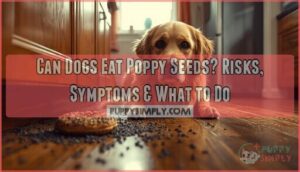This site is supported by our readers. We may earn a commission, at no cost to you, if you purchase through links.
A bagel topped with poppy seeds might seem like a harmless breakfast, but for your dog, a few stray seeds off the counter could trigger opioid toxicity. Poppy seeds come from the same plant that produces morphine and codeine, and dogs process these compounds far less efficiently than humans do. Even small amounts can overwhelm a dog’s nervous system in ways that escalate fast.
Most pet owners don’t realize poppy falls on poison control‘s toxic plant list for dogs. Knowing whether dogs can eat poppy seeds—and what to do if they already have—could genuinely make the difference between a quick recovery and a veterinary emergency.
Table Of Contents
- Key Takeaways
- Can Dogs Eat Poppy Seeds?
- Why Poppy Seeds Are Dangerous for Dogs
- Symptoms of Poppy Seed Toxicity in Dogs
- How Much Poppy Seed is Harmful?
- What to Do if Your Dog Eats Poppy Seeds
- How to Prevent Poppy Seed Ingestion
- Frequently Asked Questions (FAQs)
- What happens if dogs eat poppy seeds?
- Can my dog have poppy seed bread?
- What happens if a dog eats poppy seeds?
- Can dogs eat poppy seed biscuits?
- Can dogs eat bagels with poppy seeds?
- Are poppies poisonous to dogs or cats?
- Are there dog breeds more sensitive to poppy seeds?
- Can poppy seeds interfere with dog medications?
- Are there safe alternatives to poppy seeds in dog treats?
- Can poppy seed oil harm dogs too?
- Conclusion
Key Takeaways
- Even a small amount of poppy seeds can cause opioid toxicity in dogs, leading to serious symptoms like lethargy, vomiting, and breathing problems.
- There is no safe dose of poppy seeds for dogs, as factors like breed, size, age, and health condition all affect how severely they are impacted.
- Poppy seeds and all foods containing them should be kept away from dogs, since accidental ingestion can quickly become a veterinary emergency.
- If your dog eats poppy seeds, do not wait for symptoms—call your veterinarian or a pet poison helpline right away for guidance.
Can Dogs Eat Poppy Seeds?
No, dogs can’t eat poppy seeds — not even a small sprinkle from a bagel or muffin. These tiny seeds come from the opium poppy plant, and while they seem harmless as a food topping, they pose a real dog health risk.
If you’re looking for a safer snack alternative, plain air-popped popcorn is one treat dogs can actually enjoy without the same risks.
Pet poison hotlines classify poppy as toxic to dogs, and food safety around your pup matters more than you might think. Even a bite shared without a second thought can put opium toxicity on the table.
For further guidance, you can read about central nervous system damage that can occur in dogs who ingest poppy seeds.
Why Poppy Seeds Are Dangerous for Dogs
Poppy seeds might seem harmless sitting on top of a bagel, but for dogs, they carry real risks tied to their natural chemistry. The problem comes down to what’s actually inside those tiny seeds and how a dog’s body reacts to it.
Here’s what you need to understand about why poppy seeds are dangerous for your dog.
Opiates in Poppy Seeds
Poppy seeds from the Papaver somniferum plant carry a real risk of opium toxicity that many pet owners don’t expect. Opiate contamination doesn’t sit inside the seed itself — it clings to the outer surface as dried sap residue.
Morphine and codeine are the primary culprits, and while seed washing can reduce alkaloid removal by up to 80%, enough remains to trigger opioid poisoning, making poppy seed regulation in pet-safe foods a genuine concern.
For more details about the potential for positive opiate test results from poppy seed ingestion, check reliable testing information.
Dog Sensitivity to Alkaloids
Even after washing reduces surface alkaloids, your dog’s body processes what remains very differently than yours does.
Canine toxicology shows that dogs are far more sensitive to opioid receptors stimulation at lower doses relative to body weight. Small breeds face even higher risk — a teaspoon that barely affects a large dog can trigger real neurological effects in a chihuahua through straightforward alkaloid metabolism differences.
Potential Health Risks
So what does that sensitivity actually mean in practice? The health concerns span several body systems at once. Opioid poisoning isn’t the only worry — canine reactions can include:
- Neurological damage, such as seizures, disorientation, or coma
- Gastrointestinal obstruction and inflammation, causing vomiting or diarrhea
- Cardiovascular stress, including slowed breathing and heart rate
Toxicity levels vary, but allergic reactions and opium toxicity symptoms can escalate fast.
If your dog eats jelly beans, even a small amount can quickly lead to serious symptoms — knowing which jelly bean ingredients are toxic to dogs could make all the difference in an emergency.
Symptoms of Poppy Seed Toxicity in Dogs
When a dog gets into poppy seeds, the signs don’t always show up right away — and that delay can make it easy to miss what’s happening.
Some symptoms are subtle at first, while others can escalate quickly depending on how much your dog ate. Here’s what to watch for.
Digestive Upset
Your dog’s gut health takes one of the first hits after poppy seed ingestion. Stomach issues usually show up fast — vomiting starts within one to six hours, while diarrhea can follow within twelve.
These bowel problems aren’t just unpleasant; repeated episodes cause real intestinal damage and dehydration. Small breeds especially can’t afford that fluid loss, so don’t wait to act.
Lethargy and Drowsiness
Sedation sneaks up fast after poppy seed ingestion. The opioid alkaloids target your dog’s central nervous system, triggering neurological depression that looks like deep exhaustion.
Watch for lethargy, heavy eyelids, slow responses, or a foggy, zoned-out stare. These drowsiness symptoms signal real opioid toxicity affecting canine health. If your dog barely lifts its head when called, that’s not tiredness — it’s a warning.
Breathing and Heart Issues
Opioid toxicity doesn’t stop at drowsiness — it strikes your dog’s heart and lungs next. These toxic substances suppress the central nervous system deeply, triggering respiratory depression and dangerous cardiac changes.
Watch for these emergency response warning signs:
- Breathing rate drops below 10 breaths per minute
- Heart rate slows, signaling possible cardiac arrest risk
- Gums turn bluish — oxygen therapy becomes urgent
- Weak pulse indicates heart rate monitoring is critical
Severe Neurological Signs
When poppy toxins hijack your dog’s nervous system, things can escalate fast. Neurotoxin effects hit hard — triggering seizure risks, disorientation, and even coma if left untreated.
Central nervous system depressants like morphine alkaloids cause neurological damage that’s surprisingly swift.
| Neurological Sign | What You’ll Notice |
|---|---|
| Ataxia | Stumbling, drunken walk |
| Seizures | Full-body convulsions |
| Pupil changes | Pinpoint or wide pupils |
| Coma | Unresponsive, won’t wake |
How Much Poppy Seed is Harmful?
Here’s the tricky part — there’s no clear cutoff number that applies to every dog. A few factors determine how much is too much, and some food sources hide poppy seeds in ways you mightn’t expect.
Here’s what you need to know.
Amount Needed for Toxicity
There’s no safe dose in the context of poppy seed ingestion — that’s the tricky part. Alkaloid variability means one tablespoon can deliver anywhere from a trace amount to hundreds of micrograms of morphine.
With poppy seeds, there is no safe dose — a single tablespoon can carry enough morphine to poison your dog
Clinical thresholds are crossed before a lethal dose is reached, so even moderate exposure triggers poisoning. Veterinarians treat any opium poppy ingestion cautiously, because toxic dose uncertainty makes guessing dangerous.
Factors Affecting Dog Susceptibility
Not every dog faces the same level of risk — your dog’s individual profile matters more than you might think. Body size, age, breed sensitivity, and underlying health conditions all shape how severely poppy seed alkaloids hit.
Here are four key factors in canine nutrition and poisoning prevention:
- Dog Body Size — Smaller breeds absorb higher alkaloid concentrations per pound.
- Age Factors — Puppies and seniors process toxic substances more slowly.
- Genetic Predisposition — Herding breeds with ABCB1 mutations face amplified sensitivity.
- Health Conditions — Liver or kidney disease delays opioid clearance substantially.
Hidden Sources in Foods
Beyond individual susceptibility, poppy seeds hide in everyday foods you might not suspect. A poppy seed bagel on the counter or a slice of poppy seed bread left within reach can become a quiet hazard.
Food toxicity often starts with overlooked moments.
| Common Hidden Source | Why It’s a Risk |
|---|---|
| Poppy seed bagels | Easy counter access for curious dogs |
| Salad dressings | Dogs lick plates clean unknowingly |
| Baking ingredients | Open bags spill concentrated seeds |
| Lemon poppy seed cake | Dense seed load in small bites |
| Restaurant takeout buns | Seeds scatter on car seats and floors |
What to Do if Your Dog Eats Poppy Seeds
Finding out your dog ate poppy seeds can feel like a punch to the gut, but staying calm and acting fast is what matters most.
The steps you take in those first few minutes can make a real difference. Here’s exactly what you should do.
Immediate Actions for Pet Owners
The moment you suspect accidental ingestion, act fast — move your dog away from the source and secure any remaining food so other pets can’t reach it. Gather key details like how much they ate and when, because this information shapes veterinary advice substantially.
For emergency response and pet safety, don’t attempt home remedies; toxicity prevention depends on calling poison control or a vet immediately for proper vet consultation.
When to Call a Veterinarian
Once your dog has had any poppy seed ingestion, don’t wait for symptoms to appear. Call your vet or Poison Control (Pet Poison Helpline: 855-764-7661) right away — even if they seem fine.
Toxicity levels vary by dog size and health, so veterinary advice matters early. Emergency signs like stumbling, slow breathing, or unusual drowsiness mean urgent care is needed without delay.
Monitoring and Treatment Steps
After calling your vet, the real work begins — watching closely and following their lead. For accidental ingestion, home monitoring means checking your dog every 15 to 30 minutes for the first several hours.
Depending on toxicity levels, veterinary care may include activated charcoal, IV fluids, or naloxone for opioid reversal. Treatment options and the recovery process vary, but early veterinary advice always shapes the outcome.
How to Prevent Poppy Seed Ingestion
Prevention is really the best medicine in terms of keeping poppy seeds away from your dog.
A few simple habits can make a big difference in keeping your pet safe at home and beyond.
Here’s what you can do to lower the risk.
Safe Food Storage at Home
Your kitchen setup matters more than you might think. Keep poppy seed-containing baked goods and leftovers refrigerated at proper fridge temperatures, ideally at or below 40°F. Follow smart freezer practices and pantry essentials like airtight containers on high shelves.
Preventing cross contamination between pet-accessible areas and human food storage is key. Simple organization keeps curious noses away from anything harmful.
Training Dogs to Avoid Human Food
Training is one of your best tools for accidental ingestion prevention. Leave It Training teaches your dog to turn away from dropped food on command, building the canine self-control that makes mealtime boundaries stick.
Pair this with dog impulse control games and a consistent “place” routine during meals. Food discipline practiced daily keeps toxic foods for dogs — like poppy seeds — safely out of reach.
Alternative Safe Seeds for Dogs
Fortunately, dog nutrition doesn’t have to feel restrictive. Plenty of seeds genuinely support animal nutrition without the risks of toxic substances like poppy seeds.
Chia seed benefits include omega-3s and fiber for digestion. Flaxseed uses range from coat health to stool consistency.
Pumpkin seeds support immunity, hemp oil boosts skin health, and sunflower seeds offer vitamin E — all solid, dog food safety-approved choices.
Frequently Asked Questions (FAQs)
What happens if dogs eat poppy seeds?
Poppy seed toxicity is a real concern for dogs. Even small amounts can trigger canine opioid exposure, causing lethargy, digestive upset, and seed ingestion risks that affect your dog’s nervous system quickly.
Can my dog have poppy seed bread?
No, your dog shouldn’t have poppy seed bread. Even small amounts carry real toxicity risks, and the Pet Poison Helpline classifies poppy seeds as dangerous for dogs.
Stick to seed-free alternatives instead.
What happens if a dog eats poppy seeds?
Even a small amount can trigger opioid effects — lethargy, disorientation, and slowed breathing. Canine response to poppy plant alkaloids is swift, making food toxicity in dogs a serious, fast-moving concern.
Can dogs eat poppy seed biscuits?
No, poppy seed biscuits aren’t safe for your dog. Biscuit toxicity is a real concern here — seed contamination with opioid alkaloids poses serious canine health risks, even in small amounts.
Can dogs eat bagels with poppy seeds?
That golden bagel on your counter might look harmless, but one with poppy seeds is a real canine health risk. Don’t share it — the baked goods dangers and toxicity make it unsafe for dogs.
Are poppies poisonous to dogs or cats?
Yes, poppies are poisonous to both dogs and cats.
The plants and seeds contain alkaloids like morphine and codeine, which cause serious neurological risks and can harm your pet’s central nervous system.
Are there dog breeds more sensitive to poppy seeds?
Just like some people metabolize caffeine faster than others, certain dog breeds show heightened sensitivity to opioid compounds.
Herding breeds with the MDR1 gene variant and lean sighthounds face greater canine toxicity risks from poppy seeds.
Can poppy seeds interfere with dog medications?
Yes, they can. Poppy seeds contain alkaloids that compete with sedative interactions and liver metabolism pathways, potentially affecting pain control impact and drug test accuracy — making veterinary care and advice essential for dogs on medication.
Are there safe alternatives to poppy seeds in dog treats?
Absolutely — there are several great seeds for dog treats. Flax seed uses, chia seed benefits, pumpkin seeds, sunflower options, and hemp alternatives all support dog nutrition and health safely.
Can poppy seed oil harm dogs too?
Poppy seed oil sits in a gray area. The refining process lowers alkaloid levels, but opiate contamination and dog fat intake risks—including pancreatitis—still make it a toxic substance your dog doesn’t need.
Conclusion
Protecting your pup means paying attention to the small stuff—even something as seemingly simple as stray seeds on the counter.
Regarding the question of whether can dogs eat poppy seeds, the answer is a clear and firm no. A few seeds might seem trivial, but the opioid compounds inside them don’t care about portion size.
Trust your instincts, act quickly if exposure happens, and keep poppy well out of your dog’s reach.















